Two projects by young minds in Maharashtra are hoping to make invaluable contributions - from crowd control solutions at Nashik's ongoing Kumbh Mela to adoption of bee pollination to control farmer suicides in the state.
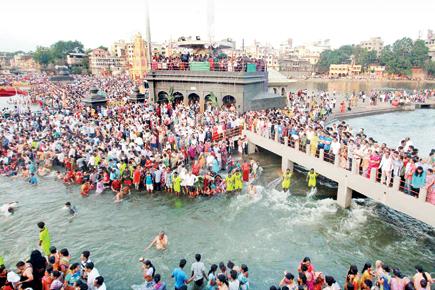
Lakhs of pilgrims take a dip at the start of the holy Kumbh Mela in Nashik on July 14, 2015.
Bee-cause it matters
ADVERTISEMENT
Bee the Change, a project that trains farmers in Maharashtra in bee keeping, was started with the aim of increasing produce and reducing farmer suicides
Two years ago, 29-year-old IIM graduate Shrikant Gajbhiye started a social entrepreneurial venture called Bee the Change, to promote bee keeping among Maharashtra’s farmers. With this project, Gajbhiye conducts bee-keeping training sessions for free, and encourages them to practise bee keeping.
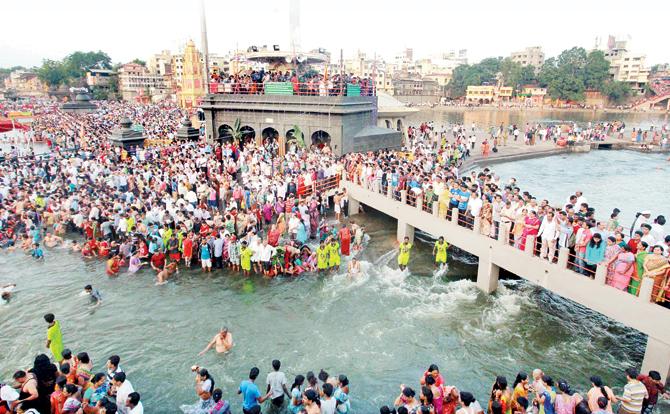
Lakhs of pilgrims take a dip at the start of the holy Kumbh Mela in Nashik on July 14, 2015. Pic/AFP
The beginning
“After completing my MBA from IIM Kozhikode, I started working in Mumbai (the company also gave the initial seed capital for this project). While I was working, I took a course in bee keeping, and learnt about the potential that bees have in increasing produce, and how this would help make farmers’ lives better,” says Gajbhiye, who hails from Nagpur. His research led to the birth of Bee the Change.
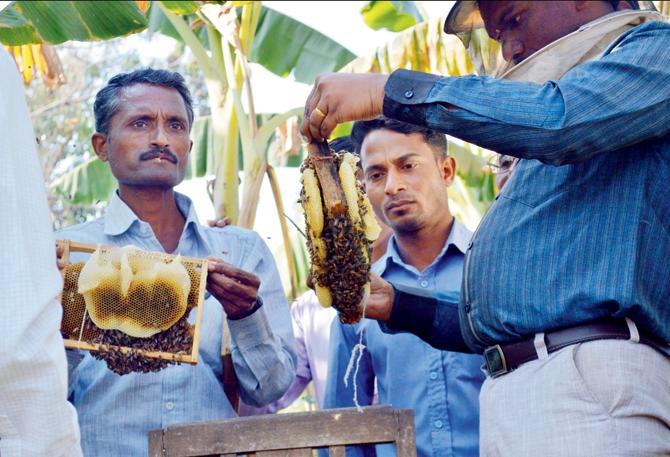
A training programme for farmers at Pauni village at Vidarbha
Why bee keeping?
Bees are a source for various products such as royal jelly, beeswax, bee venom, pollen and honey. Natural bee pollination helps increase agricultural yield in quantity and quality as it is the pollen with strongest gene that gets pollinated naturally. “For optimum crop output and balance, Maharashtra needs at least 25 lakh bee colonies, but we have only 8,000. While we get experts to teach bee keeping to farmers, not many bought bee boxes as they cost '7,000 per box. We distributed free boxes but couldn’t afford it later,” admits Gajbhiye. Word-of-mouth helped farmers gauge the importance of bee keeping. One of the farmers, who had trained under the project, had a yield of bitter gourd worth Rs 35,000 to Rs 40,000 that rose to Rs 1.5 lakh.
Of the 500-plus farmers trained under the project, those who started bee keeping have seen a rise of 200-300% in their yield. “When produce increases, food prices drop. Also, farmers have to use natural insect repellents on crops as bees die if plants are sprayed with pesticides. Hence, the crop is organic too. This leads to all-round development,” he explains. Gajbhiye has received support from Amravati’s Shree Shivaji College of Education, PhD experts on the topic, and to train experts from Khadi and Village Industries Commission. Training began at Khopoli and has now reached areas like Virli and Pauni in Vidarbha, Maharajbag in Nagpur and Hadi in Sindhudurg.
The big picture
The biggest challenge Gajbhiye faces is getting bee boxes and colonies at reasonable rates. Hence, he will initiate a crowd funding campaign by August end, with which he hopes to buy at least 300 colonies. The colonies also double by themselves in a year, hence, he aims to be self-sufficient.
LOG ON TO www.beethechange.in
Bee for business
Through this project, Gajbhiye offers to buy the honey from the farmers at a fixed price.

Founder Shrikant Gajbhiye at the training programme at Maharajbag, Nagpur

Currently, the number of farmers under the project is sufficient for larger production; still, Gajbhiye sells natural honey sourced from across India under the Bee The Change label that is available at department stores, and online as well.
Chaos control at Kumbh Mela
Led by the MIT Media Lab, the Kumbathon project brought together students from across India in 2014 to find solutions to issues that devotees face during the Kumbh Mela in Nashik
As millions of devotees descend on Nashik to participate in the Kumbh Mela, it becomes a logistic nightmare for authorities. This concern led to the creation of the Kumbathon project. This social initiative brought together over 100 student innovators from across India. Spearheaded by MIT professor, Ramesh Raskar, the Kumbathon project began in 2014, and has been working with citizen groups, students, and Indian educational and research institutes to create IT-based solutions for problems faced at the festival, and Nashik.
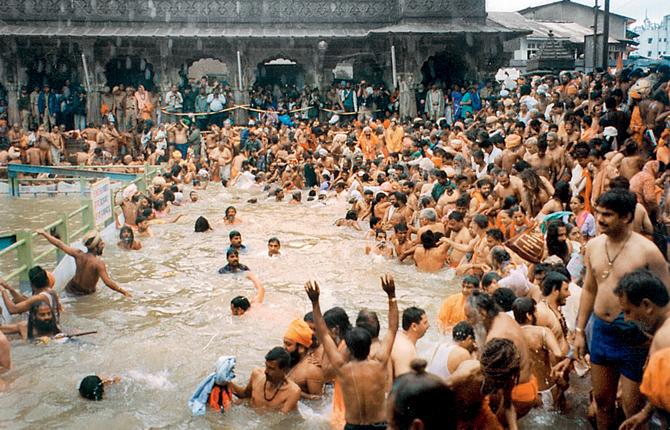
After a year-and-half of research, students were able serve one of the largest public gatherings in the world
Solutions for all
The project managed to offer multiple solutions from creating the official Kumbh Mela app, Nashik Trimbak Kumbh 2015 (available on Android) that offers information about Nashik to newcomers, to Health Track, a medi tracker which offers one-stop shop for all emergency services at a click of a button. There’s also the web portal Annadann.org, which aims to collect monetary donations from across India and use it to provide nutritious and hygienic meal to pilgrims visiting the Kumbh Mela, as well as Rent My Home, a web-based service (Rentmyhome.webege.com) that would help the devotees find paying guest accommodation in Nashik.
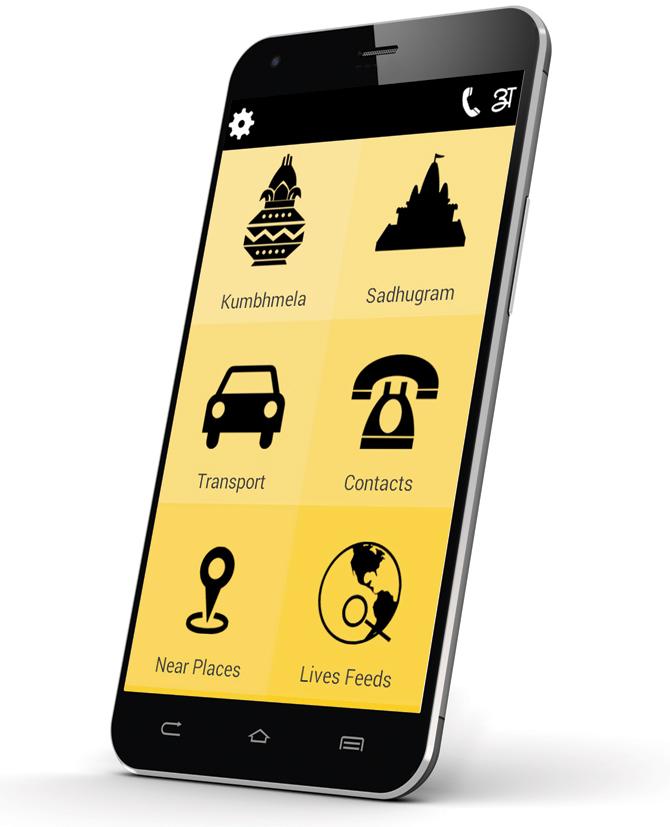
Aditya Dasgupta, a student of the city-based WeSchool, who has been looking after the business side of the Rent My Home, says that every city that hosts the Kumbh Mela faces a seasonal shortage of accommodation, and with Rent My Home they hope to minimise it to a certain level. “We are still at the initial phase; our goal is to bring a minimum of 200 house owners on-board in the first phase, offering 400 beds to visitors during the Kumbh Mela. Eventually, we will adding beds to the portal,” says Dasgupta.
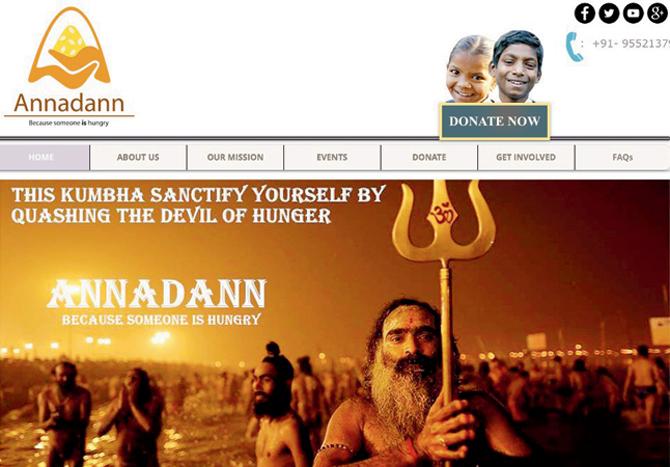
Rent My Home is currently available only as a web service but the team behind the app is planning to integrate location maps of houses as well as Skype call facility to allow tenants and house owners interact with each other before closing a deal. “We have also managed to bring in some schools and colleges to rent out their guest rooms and halls for dormitory style of accommodation, since schools are shut during the festival,” Dasgupta adds. But that’s not all. The Kumbathon team has also created a crowd steering app based on mobile data to allow crowd management during the Kumbh Mela.
User friendly
There’s also the app, All Shops Online that has managed to list 1,500 shops in Nashik. The list includes chemists, groceries, electronics and garment shops, among others. “We made this app so that devotees will be able to find a shop when they need it,” says Sanchi Paingy, a PGDM student from WeSchool, who handled the marketing side of the project along with Richa Agrawal also from the same college.
But the most important part what the team behind the All Shops Online app has done, is that they have manually cross-checked the GPS co-ordinates of these shops, and updated them on Google Maps to ensure visitors don’t get lost or have incorrect addresses.
The Kumbathon Project will also see the debut of smart bin which automatically segregates wet, dry and metal waste into different bins.
 Subscribe today by clicking the link and stay updated with the latest news!" Click here!
Subscribe today by clicking the link and stay updated with the latest news!" Click here!






